WWI and the villagers of BUdjak (the experience of micro-history)
In the article the former Bulgarian colony Shikirli Kitai (now Suvorovo) located on the Danubian border of the Russian Empire is used as an example to show how the socio-economic position and mentality of the local population changed during WWI. The massive mobilization shifted the most of the peasant's toil on women, which promoted their emancipation. Military failures largely revolutionized the soldiers to some. The collapse of the army, lack of goods and social disorders triggered chaos in Russia in 1917. In Shikirli-Kitai the anger of the poor led by the soldiers returning from the front was directed against the local authorities and the priest. Such "revolts" took place around Budjak, as there were no large landowners. Intoxicated by the freedom of their own reforms, the villagers were taken aback when Bessarabia came under Romanian rule in a matter of weeks.
Keywords
Россия, Румыния, Суворово, Шикирли-Китай, война, солдаты, мобилизация, тяжелое положение, потери на фронте, раненые, пропавшие без вести, попавшие в плен, революция, бедняки, примар, гонения на священников, Russia, Romania, Suvorovo, Shikirli-Kitai, war, soldiers, mobilization, difficult circumstances, casualties, wounded, missing in action, captivity, revolution, the poor, Primar, suppression of priestsAuthors
| Name | Organization | |
| Russev Nikolai | G. Tsamblak State University of Taraclia | nrussev@mail.ru |
References
_9_2016_1476371722.jpg)
WWI and the villagers of BUdjak (the experience of micro-history) | Rusin. 2016. № 3 (45). DOI: 10.17223/18572685/45/15
